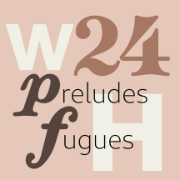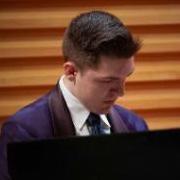All Activity
- Today
-
Hello everyone, I’m working on a new piece that’s more harmonically adventurous than my usual style and would love your feedback. It was originally for flute and piano, but since I did not like the flute sound from Musescore, I used a soprano voice instead. That made me consider turning it into a Lied with syllables rather than lyrics (since I can’t write lyrics). The main theme began as a neotonal composition practice exercise based on a post in the Talkclassical forum: Step 1. Write a diatonic melody in a mode missing one note. Step 2. Use a different mode or scale for the harmony. My melody is in C Ionian without F, and the harmony is C ascending melodic minor (C major with Eb, though I ended up using E here and there too). I later added a B section with the melody focusing on the unused note F. The form is [:A:][:BA:]. I’m unsure about a few things: Does the piece and structure work overall? Does the harmony work? (I am still considering piano voicings in section B, particularly in m.10, but A is finished). Since A repeats four times (and it is a period, so there is internal repetition too). Should I get rid of the initial repetition of A? Or maybe varying the harmony/accompaniment in the second repetition or even adding a C section? I always get stuck with same simple form and I also do not know how to reharmonize themes without making it lose the balance. Does it work better as a vocal piece or another instrument would be better (specially since there are no lyrics)? Not sure if it should be a Lied, a Song without words, a Romance, or what. Is there a way to indicate that the melody can be played with any suitable instrument freely? Technically it is in C Minor (it starts and ends in it) but since it uses mostly natural A and natural B throughout, and natural E on the melody, I used the Cmaj key signature. Is that okay or I should change it to using three flats like in natural C minor? Thanks for listening and any feedback is welcome! PD: I found out that the first 4 notes and main motive of the piece (and the mood, because of the vocal singer) is similar to Jerry Goldsmith's theme to 'The Illustrated Man'. I never heard it before so it was a pure coincidence. I think the harmonization of those 4 notes is different, though.
-
Demertzis started following Op.60 2nd mvt and Op.13
-
MY_MUSIC_013_20240216_043213_AudioVerb_1_054908265.mp3
-
Good luck with it😂
-
PeterthePapercomPoser started following Waterfall and Concert performance of my piece for harpsichord
-
Henry Ng Tsz Kiu started following Concert performance of my piece for harpsichord
- Yesterday
-
Alex Weidmann started following Concert performance of my piece for harpsichord
-
Hi to all. Just wanted to share this recent performance by professional harpsichordist Katarzyna Kowalik, of my work "The Sun Dappled Forest". The work was inspired by J.S. Bach and William Byrd; but I guess it also sounds a bit Halloweeny: so topical! Apologies for the low record level. (Please note the applause at the beginning and end is very loud by comparison!) Hope you enjoy.
-
Henry Ng Tsz Kiu started following an impossible to play cover of twinkle twinkle little star
-

2025 Halloween Satisfaction Survey
Wieland Handke replied to PeterthePapercomPoser's topic in Monthly Competitions
Oh no! I liked all the pieces very much. Your „Trio Variations” are neither „terrifying“ nor too „well-behaved”; I find them „good balanced.” That's why I placed them in the third category, right next to my own. (Hahaha, you voted for yourself ...) -
TristanTheTristan started following Waterfall , an impossible to play cover of twinkle twinkle little star and my first piano piece
-
Great! Try writing more complex pieces.
-
Nice piece! I see you used special rhythms too!
-
Kotzwara. You can check yourself.
-
Oh, just like me!
-
Also prokofiev 2 and rach 3.
-
2025 Halloween Satisfaction Survey
TristanTheTristan replied to PeterthePapercomPoser's topic in Monthly Competitions
You don't like mine... that is depressing. -
Wings of icarus. Piano sketch. WIP
Fruit hunter replied to Bjarke's topic in Piano Music, Solo Keyboard
Hello, I enjoy this piece a lot. I appreciate the key changes and the harmonic context given. The rhythmic content is also really good. The only things I have to say, though is that the left-hand could be a little bit louder in the introduction in the first few measures first 30 most likely. Also, this is just a playability issue but make sure that some of the left-hand stuff if it goes above the staff to put in treble if need be. I think you’re already doing it but there’s some parts where there’s like six ledger lines on the left hand. But I enjoy the moment given off from this piece. Good job. -
Wings of icarus. Piano sketch. WIP
Alex Weidmann replied to Bjarke's topic in Piano Music, Solo Keyboard
Hi Bjarke, Think it's a good piece; but the ending feels rather abrupt to me. If it were my work, I would end with a pattern of descending arpeggios from high to low register, followed by the chords you already have. Might also be worth experimenting with ebbs and flows in the tempo to create some rubato. Not sure it would work; but may be worth a try. -

piano Is my Piano Prelude any good? (Recorded Performance)
Mooravioli replied to Mooravioli's topic in Piano Music, Solo Keyboard
hello mark, thank you truly for your comment, there were many influences that went into this work: shostakovich’s jazz suites, a few latin american rhythms, and my own personal anxieties during that period. I think the trio was directly inspired by my efforts, in trying to find a sense of peace through writing. I believe the added extensions are default chords I usually navigate to, to bring color to the harmonies. This is a more personal work, but hope it maintains some individuality. elated that you enjoyed my work. -
.thumb.png.8b5b433a341551e913a34392660bc95b.png)
2025 Halloween Satisfaction Survey
PeterthePapercomPoser replied to PeterthePapercomPoser's topic in Monthly Competitions
Thanks for your vote and for voicing your opinions @MK_Piano! We have had this idea at the end of the last formal competition - "Dreamscapes" - which had monetary prizes and an official set of judges. As can be seen at the end of the "Dreamscapes" Satisfaction Survey linked below 5 out of 10 voters in the survey liked the idea of having tiered divisions for entrants of different skill levels. I think one of the problems with this idea is that we can never know if we'll even have enough participants joining the competition to justify having even just two different tiers. And would this also imply that the prize money will be split evenly between the different winners from the different tiers? Or would the more advanced tier get the lion's share of the prize money? But either way, I think from looking at the results (so far) of this 2025 Halloween Satisfaction Survey, the emergent fashion seems to be that people prefer to keep the competitions as casual as possible or just for fun and without monetary prizes. The formatting was optional. All the reviewers were free to use the reviewing template or dump it and make their own. Or just write comments and forget any kinds of categories or numerical scales. In the past when we had official competitions with monetary prizes, the official judges talked to each other about the entries (the composers of which were kept anonymous by me) on a set of competition dedicated discord channels on the Young Composers Spot discord server. We were a team and presented a concerted effort to review all the entries as consistently as possible. And as mentioned above in my response to @Wieland Handke's post, the only thing that needs to be consistent from one judge to another is the differences between the different entries. So that even if each judge rates the entries in a different range of the numerical scale, as long as the differences between the different scores are consistent across the whole set of entries, the scores all get averaged between the judges and produce a fair result. Thanks for your response and sharing your thoughts! -

2025 Halloween Satisfaction Survey
MK_Piano replied to PeterthePapercomPoser's topic in Monthly Competitions
I just finished my little vote. I had a fun time, even if I didn't "win," I still feel I gained some experience. Heck, it gave me a passion to make new music and make more music of similar instrumentation. I was happy to see that I was not the only one who did a Piano Quartet with Strings to pair. It was refreshing to hear how different 3 people can make contrasting music with the same constraints. I will reference them in the future when it comes time to do more. 🙂 About the grading or reviewing aspect, I think a simple solution is to keep brackets or divisions for submissions. We saw a complete mix of tonal and post-tonal, amatuer and professionals. It can be hard to grade them all at an equal level when you have to conform yourself to a different standard for each person. I want to be the first to suggest this idea: I think before the next competition, you should categorize users by division based on an entry poll or application. Like most real festivals, forums or competitions, each user will have to file an application to enter with their work. Some places in the US are now asking for cover letters and resumes to pair. Since the point is to keep it fun and more informal, I suggest making a poll asking for people to help gauge their experience: "Have you seen your works performed?" "Have you taken music theory before?" "How many years have you been writing music? "Do you have the ability to write sheet music?" "Will you submit a post-tonal (Without key-center) or tonal (with key-center) work for this event?" Etc. Similar to existing competitions, we can categorize people before hand, create divisions and judge more accurately. Some divisions such as the following: Amatuer Professional Post-Tonal Tonal This was my only gripe with the formatting. It felt hard to review everyone to a level standard when the goal-post was never consistent. I do not want to feel like the bad guy for using language or concepts they are not aware of, or risk being redundant if it is clear they have experience. The table used for reviewing was a little vague as it felt more subjective. I do not mind that when rating music, however, it may be nice to specify what you mean by "Originality" or "Textures". Someone may have a different understanding of what those words mean and it will affect their reviews. Defining some of them beforehand will also standardize the ratings. Thoughts? 🤔 -
I think the real question here is "Can someone with aphantasia be an aesthete?" Possibly. I don't know that it's ever been studied, but I do suspect it is comparatively rare. I've always had hyper-phantasia and like most of that sort, was shocked to learn that this isn't the norm. I definitely believe it must be better to have this ability than not. My opinion on musical composition and art is that great works are the product of technical craftsmanship (which can be taught) meeting with an strong sense of aesthetic taste (which cannot be taught, but is understood fairly universally by those who experience it.) Since the latter is innate, I suspect there is a strong correlation with hyper-phantasia and aesthetes. So I would bet money that the greatest composers and artists had hyperphantasia. While it might not afflict ones ability to enjoy or recognize beauty, it probably does affect one's ability to reliably create it.
-
Requiem pro mundo moriente
Alex Weidmann replied to BipolarComposer's topic in Orchestral and Large Ensemble
Have listened to all of this now. I noticed all but one of your movements follow the naming scheme of Mozart's Requiem. The suite feels mournful, with a flavour of Antiquity, and makes good use of percussion throughout. Sounds like Halloween music at times. The highlight for me was the mysterious last movement. Reminded me a little of the final movement of Holst's Planet Suite. This comes as a welcome relief, after the frantic dissonance of the preceding movements. - Last week
-
piano Is my Piano Prelude any good? (Recorded Performance)
MJFOBOE replied to Mooravioli's topic in Piano Music, Solo Keyboard
Very interesting harmonies, rhythms,and ,melodic lines ... Can you tell us something about your style and intent here? Jazz? I enjoyed your work. Mark






